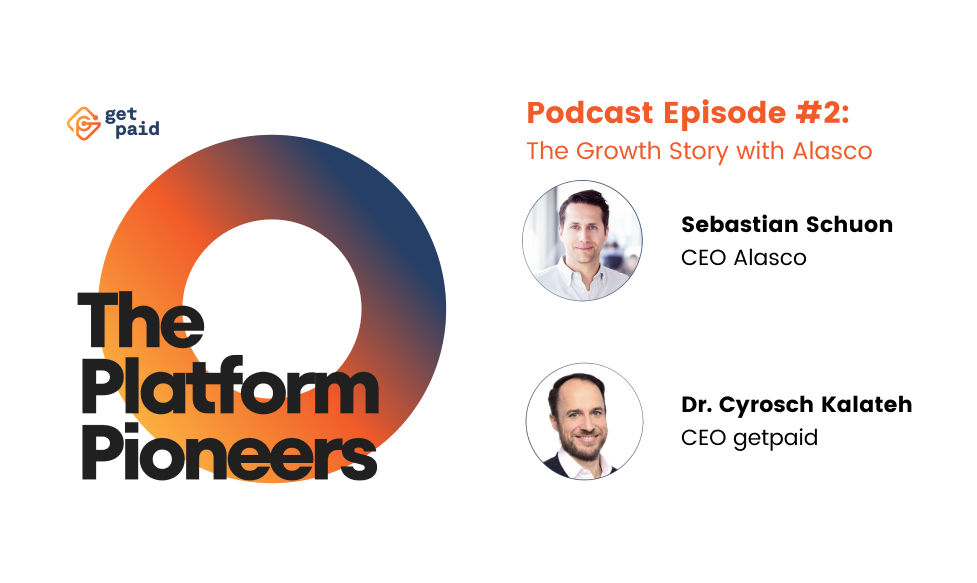5 key learnings from transforming paper-heavy industries with Alasco

In the second episode of The Platform Pioneers podcast, Sebastian Schuon, co-founder of Alasco, shared valuable insights on digitizing the construction and real estate industry. Schuon emphasized the importance of standardizing processes, adapting to customer needs, leveraging data-driven decision-making, integrating sustainability, and fostering collaboration for efficiency. These key learnings provide a roadmap for founders of digital platforms & marketplaces to create innovative solutions that address industry challenges and unlock growth opportunities. Tune in to the episode for an in-depth understanding of how Alasco is transforming the real estate sector through digitization and collaboration.
Key Learning #1: Identify the areas of operation where digitization can make the most impact and start building there
Summary: Sebastian Schuon highlights the importance of digitizing and standardizing processes in the construction and real estate industry. He believes that while each building can be individual, the processes behind construction can and should be standardized to improve productivity and efficiency.
What we can learn: For founders of digital platforms, this approach demonstrates the value of focusing on creating solutions that address the inefficiencies and lack of standardization in traditional industries. By identifying the areas where digitization and standardization can make the most impact, founders can develop innovative products that solve real problems and drive growth in their respective markets. Consider an eCommerce platform that automates supply chain processes, reduces manual labor, and enhances operational efficiency. By optimizing inventory management, tracking shipments in real-time, and streamlining returns management, businesses can improve the overall customer experience.
Key Learning #2: Create a continuous cycle of customer adaptation
Summary: Sebastian emphasizes the need to follow customer needs and adapt the software to their lifecycle. He mentions that Alasco is expanding internationally to serve its customers better and adding more use cases to address their evolving requirements.
What we can learn: Founders of digital platforms should prioritize understanding their customers' needs and pain points. By continuously adapting their products to serve their target users better, they can maintain a strong competitive advantage and foster customer loyalty. Reflect on a ride-hailing platform that continually adds new features and services based on user feedback. This demonstrates the commitment to understanding their customers' needs and adapting the platform to maintain a competitive edge in a constantly changing market.
Key Learning #3: Optimize company operations by data-driven decision making
Summary: In the episode, Sebastian discusses the potential for data-driven decision-making in the real estate industry. He believes that by standardizing data and processes, companies can make better-informed decisions and optimize their operations.
What we can learn: For digital platform founders, this insight highlights the importance of leveraging data to enable smarter decision-making. By developing solutions that collect, analyze, and present data in an actionable manner, founders can help their users unlock the full potential of data-driven insights. Picture a health tech platform that collects data from wearable devices, analyzes it, and offers personalized insights to users. This approach allows users to make informed decisions about their health and well-being, showcasing the power of data-driven decision-making in improving lives.
Key Learning #4: Consider integrating sustainability features for market differentiation
Summary: Sebastian identifies the growing trend of "managed to green" in the real estate industry. He explains that addressing the industry's environmental impact is crucial, given that real estate contributes to 37% of global CO2 emissions.
What we can learn: Founders of digital platforms should consider incorporating sustainability and environmental concerns into their solutions. By doing so, they can not only help their users address pressing global challenges but also differentiate themselves in the market and appeal to environmentally-conscious stakeholders. Imagine an energy management platform that helps businesses monitor and reduce their energy consumption. By providing real-time insights into usage patterns, recommending energy-saving measures, and automating energy-efficient practices, the platform can contribute to global sustainability efforts.
Key Learning #5: Create an ecosystem of collaboration between stakeholders and foster distributed work styles
Summary: Sebastian observes an increasing trend towards more distributed and collaborative work styles in the real estate and construction industry. He sees this as an opportunity for Alasco to facilitate collaboration between different stakeholders and improve overall efficiency.
What we can learn: Digital platform founders should recognize the value of fostering collaboration and communication among their users. By designing products that facilitate seamless interactions between different stakeholders, founders can create a more efficient and interconnected ecosystem that benefits all parties involved. Envision a project management platform that connects teams across various disciplines and departments, fostering collaboration and communication. This seamless interaction allows for streamlined workflows and efficient project execution, benefiting all stakeholders involved in a project's life cycle.


